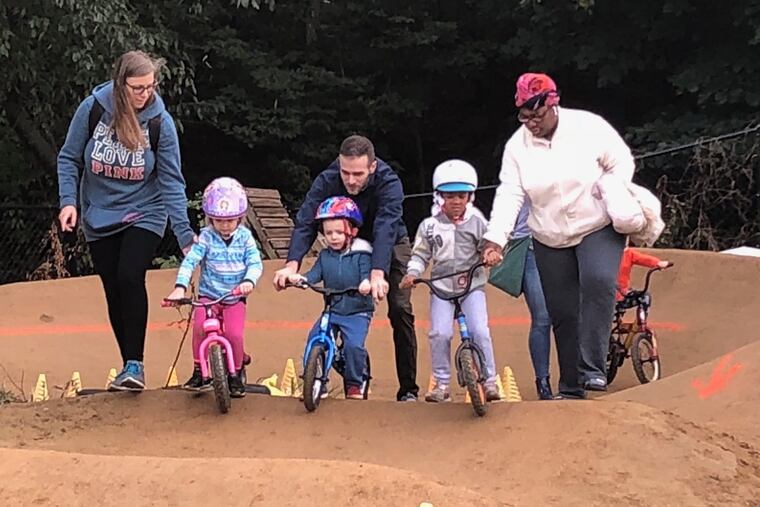Behind the roar of opposition against dirt bikes grows an engine of support | Helen Ubiñas
Make no mistake; the opposition to a dirt bike park isn't color-blind.

Ladies and kids under 5 got in free last Saturday at the Philly Pumptrack. And it was a toss-up who was having more fun, the fearless females learning how to ride BMX bikes on one track or the teetering toddlers on the other.
This wasn't exactly the motorized bike park I called for in my last column, but I went there because there were lessons to be learned about the grassroots effort it will take for a facility for dirt bike and ATV riders to gain any real traction in this city.
Four years.
That's how long the pumptrack project was in the works, park director Heidi Grunwald said, even with the support of the city Parks and Rec Department. And for those who aren't sure what a pumptrack is, it's a small, dirt course designed for bicycling without pedaling.
Neighbors in one part of the city voted it down, even after project organizers labored to build trust. A handful of very vocal opponents were worried about noise, crime, liability — sound familiar?
And so, they had to start from scratch in Parkside, finally opening in 2014. It's a gem of a place that lets people ride free on donated bikes if they don't have their own, but it also serves as a safe place for kids who have limited recreational outlets in the city.
That's exactly why I think a motorized bike track is worth exploring. And exactly why whoever takes the lead on the motorized bike park had better contract Grunwald as their cycling cicerone. She knows her stuff. She can help.
Despite the numerous hoops bike park supporters would have to jump, Grunwald supports the idea. In many ways, it is a natural progression for the kids who come to her park — "at least until they're too cool" for it, she joked. Then, some graduate to dirt bikes and ATVs, which are illegal to ride on the streets of Philadelphia.
Not that the law stops everyone, as we saw a few weekends ago where hundreds took to the streets in a ride in memory of a biker who was shot and killed in 2014. But as I said in my last column, where some only saw criminality (They're animals! The bikes are all stolen! You're a moron!) I saw an opportunity to at least try to find an alternative, one that could showcase talented riders and maybe even build revenue through memberships, admission fees, sponsorships … you name it.
It's not as crazy of an idea as so many insist; many municipalities are trying to figure it out. From New York to Paris, people have been floating the idea of bike parks for years. Cleveland has come closest, earmarking $2.3 million for a dirt bike track in an effort to get riders off the streets. But the plans have been shelved for now. An opportunity, I think, for us to pull ahead and lead the way.
Here in Philly, despite the roar from opponents who chose to read my last column as an endorsement of lawlessness, there is growing support from a couple of Council members and already some businesses that are working with national motorcycle advocacy associations to explore the possibility of a bike park. It's an exciting development that I hope to share more about soon.
And even more important amid the criminality and racism — because make no mistake, the opposition to these bikers isn't always color-blind — there is some solid grassroots support that's going to be vital if this idea has a chance of moving forward.
Before Mike Kasama, who was running the day's events at the pumptrack, became a professional BMX rider, he was a Philly kid who used to build tracks in the woods with his friends, which was illegal.
He and his friends would put in hours of work to ride, only to have the trails knocked down by people worried about liability.
Years later, his children are learning how to ride on the pumptrack.
"The most important thing for me has been seeing how that's affected the kids in the neighborhood and the community who have something that they know is going to be here," Kasama said. "Parents can show up, have their kids here and know that they're safe."
It can, and should, translate to motorized bikes.
"Yeah, figuring out the legalities would be hard; you'd have to make sure that these bikes are registered, insured. With the motorized, there's a lot of issues that come along with it. But nothing is impossible. These are things that a community, especially a great community like Philadelphia, should be able to do."